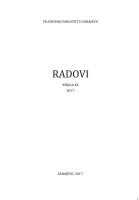SLAGANJE PREDIKATA SA BLIŽOM IMENICOM U KOORDINIRANOM SUBJEKTU U BOSANSKOM / HRVATSKOM / SRPSKOM JEZIKU
POSTVERBAL CONJOINED SUBJECTS AND FIRST CONJUNCT AGREEMENT IN BOSNIAN/CROATIAN/SERBIAN
Author(s): Nedžad Leko, Nermina ČordalijaSubject(s): Language and Literature Studies, Theoretical Linguistics
Published by: Filozofski fakultet Univerziteta u Sarajevu
Keywords: predicate agreement; postverbal subjects; collective predicates; conjoined subjects; participles
Summary/Abstract: In recent experimental research it was shown that South Slavic languages have three separate strategies of subject-predicate agreement when the subject consists of conjoined noun phrases. However, in postverbal contexts, agreement with the closest conjuct could potentially be analysed as an instance of clausal ellipsis, as claimed by Aoun, Benmamoun and Sportiche (1994). This claim is difficult to defend if a specific type of predicates is taken into account – the so-called collective predicates. This led Munn (1999) to argue that structures with collective predicates are necessarily instances of participle agreement with the linearly closest noun phrase,not of clausal ellipsis. Thus, we are confronted with two conflicting claims- one which argues clausal ellipsis, and the other favouring phrasal coordination. To resolve this conϐlict, we designed a sentence-picture matching experiment. The participants, native speakers of Bosnian/Croatian/Serbian, were asked to compare sentences containing collective predicates that precede conjoined subjects with pictures illustrating the event expressed by the sentence, and rate the level of correspondence. The results proved that the clausal ellipsis hypothesis cannot be maintained.
Journal: Radovi Filozofskog fakulteta u Sarajevu
- Issue Year: 20/2017
- Issue No: 1
- Page Range: 181-195
- Page Count: 15
- Language: Bosnian

